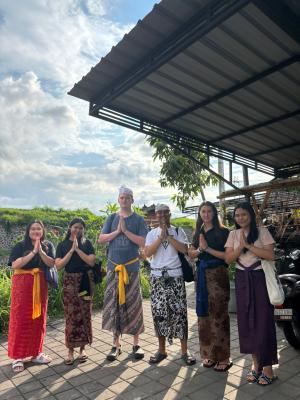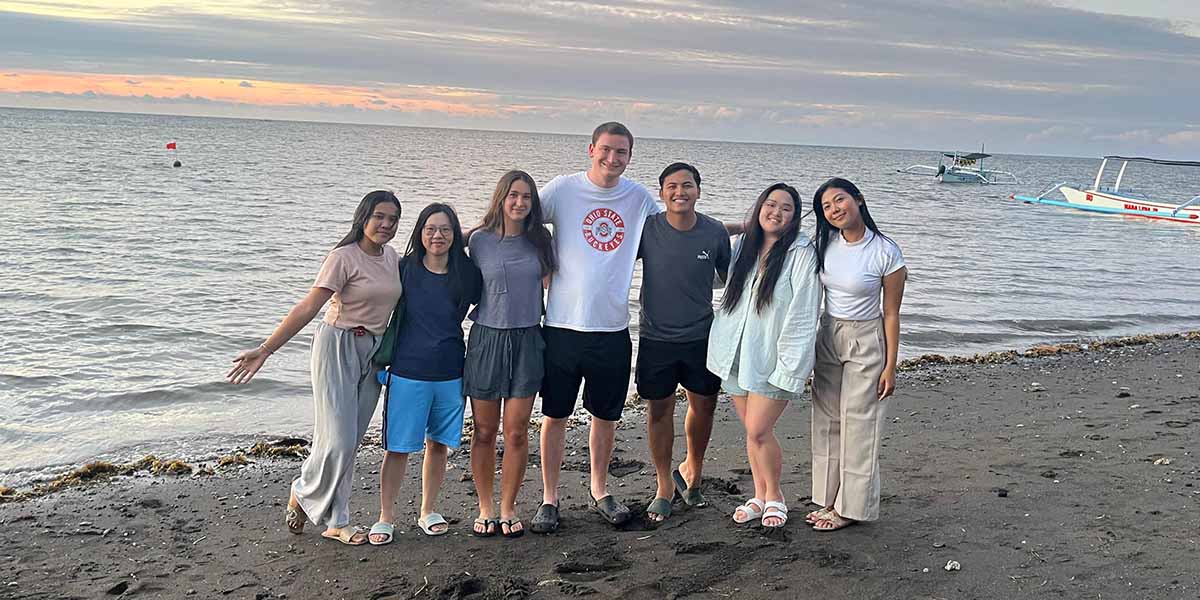Three students from the College of Education and Human Ecology traveled abroad to Bali, Indonesia to observe and study with teachers in an academy for low-income youth.
“I decided to go to Bali because I wanted to travel to somewhere I have never been before, both for the cultural exchange and to experience a different way of life,” Crystal Tang, an education major specializing in Teaching English to Speakers of Other Languages program, said. “When I first realized I got the internship, I felt both excited and nervous. I anticipated this new adventure, even though I didn’t know what to expect.”
Tang was one of three education students who was awarded a Freeman Foundation Scholarship through The Ohio State University East Asian Studies Center for a six-week summer internship. The three students traveled to Kubutambahan, Bali, Indonesia, thanks to Adrian Rodgers, associate professor in the college’s Department of Teaching and Learning, Ohio State Newark Regional Campus.
“With 17 partners in Indonesia, Ohio State’s memorandum of understanding (MOU) with them is by far OSU’s largest by partner number.,” Rodgers said. “It’s now in its 18th year. Before that MOU, OSU and Indonesia had been collaborating since 1961.”
The MOU has supported exchanges with Indonesia and by colleges across Ohio State over the years. Ohio State students, faculty and even community members, such as alumni, have taken part.
One of Ohio State’s partners is the Universitas Pendidikan Ganesha, where Nana Trianasari, PhD, is their contact. With her help, Rodgers was able to set up an internship for the students at Bali Mandara Academy. The students, in grades 10-12, are from low-income families.
“Goals for the Ohio State students were to engage deeply with local students from lowest income families in a very different culture over a period of time,” Rodgers said, “and to consider international professional teaching options after graduation.”
Learning at Bali Mandara Academy

The students touched down in May in the lush, tropical weather of Kubutambahan, which features beautiful beaches and the Air Sanih Hot Spring, as well as cultural richness in such places as the Meduwe Karang Hindu Temple.
“Through Adrian, we met a personal driver, and he would pick us up from the hotel and drive us to school each day,” said Sydney Hoang, a third-year student in the Primary Education program.
The daily drive took an hour, which Hoang said was a bit grueling: “But he also had places he wanted to show us, like cultural dances.”
At the academy, the three Ohio State students observed classes.
“Since the students speak the local language, Bahasa Balinese, at the school, they have an international track, so some of the students are learning English,” Rodgers said.
“Eventually they got comfortable with us and asked questions,” Hoang said. “They were like ‘Oh, how do you say this word?’”
Hoang also observed the teachers’ instructional methods. One instance that stood out to her was in an English class where the teacher used a song to help the students learn the language.
Hoang noted the difference between the songs sung by American students versus those by students in Bali. Instead of simple children’s songs such as “Row, Row, Row Your Boat,” the academy students sang “My Heart Will Go On” by Celine Dion.
Hoang was not only impressed by the students’ singing skills but also fascinated with the teaching method. The teacher made the song into a game by having students try to translate it from Bahasa Balinese to English.
Then, “he would put the lyrics onto the board, and they sang the whole song in English. And then he would have them sit down, and they would dissect the lyrics,” Hoang said.
Tang said she thought it was interesting how teachers used different forms of technology to get the students learning. Unlike students in Ohio, students in Bali are allowed to use their phones and play games while in class.
“For vocabulary words, they would have a list on WhatsApp. They would type a code in, then all the vocab would show up,” Tang said, when describing a Japanese class she observed.
The students lined up before their student leaders, and when it was their turn, they tried to translate the word into English.
“The leader would say if they got the correct English word,” Tang said. “I liked that they had class leaders instead of the teacher checking all the work.” Those student leaders then checked with the teacher to ensure they were correct.
Throughout the students’ time with the children, they started to notice cultural differences between America and Bali. Hoang said some of these young people are going through stages of life that college students in America have not experienced.
“I’d say that 80% of the population goes to work and the rest go to college if they can afford it,” she said. “And then a lot of people there are married by the age 25 and have kids.”
Another cultural difference that Hoang noted was in the children’s mannerisms. “Even with the younger students, there is a respect for their teachers. They have an immense amount of respect for their teachers, but they get along so well.”
“They can joke around whenever, but when we’re passing around, they bow to their teachers, and they greet them all the time.”
Enjoying and learning from Balinese culture

The Ohio State students observed at the academy during the day, which left the late afternoons and evenings to explore Kubutambahan.
To help them get to know the culture, they were paired with students from Universitas Pendidikan Ganesha, who visited them at their hotel and took them on various excursions.
One night, their guides took them to an evening food market across from their hotel. Bali is known for its many night markets, where visitors can taste local dishes for reasonable prices.
The students had fun wandering the market, tasting the different cuisine and interacting with locals.
“They’re really into spicy foods there,” Tang said. “I guess my favorite was the Sambal,” a spicy condiment added to many local dishes.
Hoang said they enjoyed trips to the beach and the beautiful tropical weather.
Each student had their own set of experiences in Bali. But they all chose the internship to gain a new perspective on teaching and of different methods to help students learn.
They ended up with a once-in-a-lifetime experience they’ll never forget. In addition, they explored Bali and its culture and met people along the way.
As the Freeman Foundation says, it is “a transformative internship program for one or more undergraduate students to emerge as global citizens, better prepared to tackle the future challenges of the ever-shrinking world about us.”
Original article written by Aria Garcia and Janet Kiplinger Ciccone for the College of Education and Human Ecology's Inspire Alumni Magazine.
